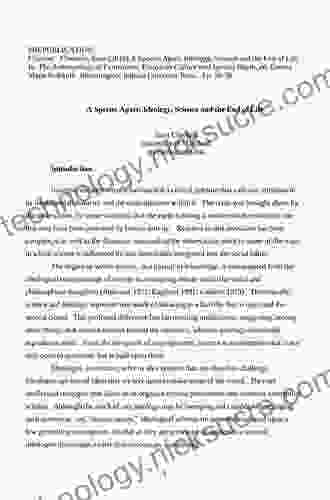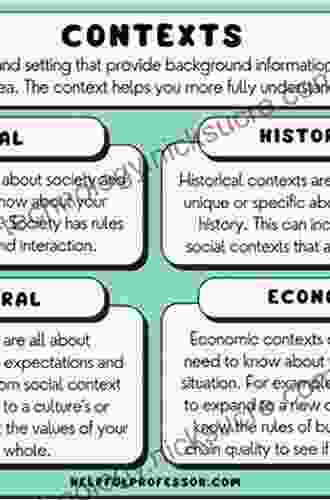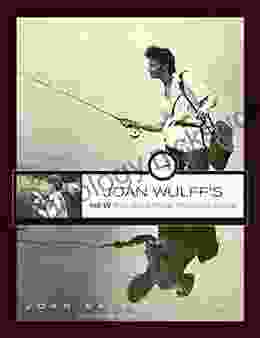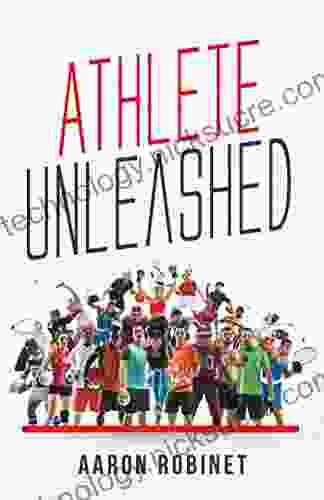Essays on Culture and Species Death: Exploring the Existential Crisis of our Time

In the face of unprecedented environmental degradation and the looming threat of climate change, the notion of species death has taken center stage in contemporary discourse. As we witness the alarming rate of biodiversity loss and the fragility of our own existence, a profound existential crisis has emerged, calling into question the nature of our culture, our relationship to the natural world, and the ultimate meaning of our lives.
5 out of 5
| Language | : | English |
| File size | : | 3179 KB |
| Text-to-Speech | : | Enabled |
| Screen Reader | : | Supported |
| Enhanced typesetting | : | Enabled |
| Word Wise | : | Enabled |
| Print length | : | 255 pages |
| Lending | : | Enabled |
In this essay, we delve into the seminal works of three influential thinkers who have grappled with the complex interconnections between culture, power, and the impending possibility of species extinction: Georges Bataille, Julia Kristeva, and Hannah Arendt. Through a nuanced analysis of their writings, we explore the ways in which they illuminate the existential crisis of our time and offer insights into the urgent need to confront our own mortality and the potential end of our species.
Georges Bataille: Transgression and the Sacred
Georges Bataille, the French philosopher and sociologist, emerged as a pivotal figure in the exploration of the dark and transgressive aspects of human nature. In his seminal work, "The Accursed Share," Bataille argues that human civilization is founded on a fundamental tension between the sacred and the profane, a tension that manifests itself in the form of violence, sacrifice, and the experience of the grotesque.

For Bataille, the sacred represents that which is both alluring and terrifying, that which both attracts and repels us. It is the realm of the forbidden, the taboo, and the excessive. The profane, on the other hand, represents the everyday world of order, reason, and control. Bataille posits that human culture is an attempt to mediate between these two opposing forces, to create a liminal space where the sacred and the profane can coexist.
However, Bataille also recognizes that this mediation is ultimately doomed to failure. The sacred, by its very nature, is uncontrollable and unpredictable. It constantly threatens to erupt into the profane, disrupting our sense of order and security. This is where the concept of transgression comes into play. According to Bataille, transgression is the act of violating the boundaries between the sacred and the profane, of embracing the chaotic and irrational forces that lie within us.
Through transgression, Bataille argues, we experience a sense of liberation and release. We confront our own mortality and the inevitability of death, and we find a way to transcend the limitations of our finite existence. However, this experience is not without its risks. Transgression can lead to madness, violence, and even death. But for Bataille, it is a necessary evil, a way to break free from the stifling confines of the everyday world and to experience the full range of human emotions.
Julia Kristeva: Abjection and the Uncanny
Julia Kristeva, the Bulgarian-French philosopher and literary critic, has also explored the dark side of human nature, particularly the concept of abjection. In her work, "Powers of Horror," Kristeva argues that abjection is that which is expelled from the body, that which is considered to be unclean, impure, or contaminating.
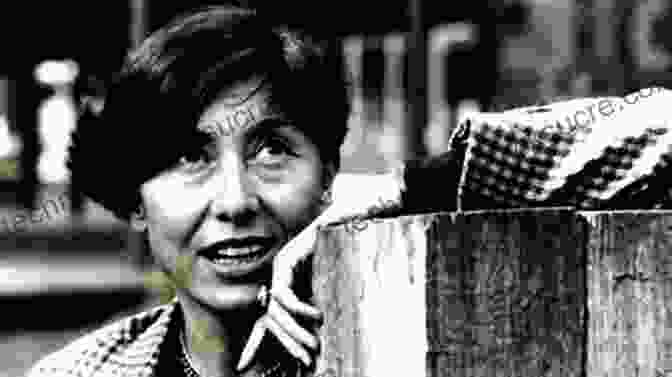
Abjection, according to Kristeva, is that which threatens to disrupt our sense of identity and our place in the social order. It is the abject that we fear and reject, but it is also that which fascinates us and draws us in. Kristeva argues that abjection is not something that can be simply eradicated or ignored. Rather, it is a part of human experience that we must confront and come to terms with.
Kristeva also explores the concept of the uncanny, a term coined by Sigmund Freud to describe that which is familiar yet strange, that which evokes a sense of unease and disorientation. The uncanny, like the abject, threatens to disrupt our sense of reality and our place in the world. It is a reminder of our own mortality and the fragility of our existence.
For Kristeva, the uncanny is closely linked to the abject. The abject is that which we have expelled from our bodies and our minds, but it is also that which returns to haunt us, to remind us of our own finitude and vulnerability. The uncanny, then, is the experience of encountering the abject, of being confronted with that which we have repressed and denied.
Kristeva's work on abjection and the uncanny has had a profound impact on our understanding of human nature and the relationship between culture and psyche. Her writings have shed light on the dark and often disturbing aspects of human experience, and they have challenged us to confront our own mortality and the inevitable end of our species.
Hannah Arendt: The Human Condition and the Banality of Evil
Hannah Arendt, the German-American philosopher, political theorist, and historian, has written extensively about the human condition, particularly the nature of power and the role of action in human affairs. In her seminal work, "The Human Condition," Arendt argues that human beings are fundamentally social creatures who are defined by their ability to act and to think.
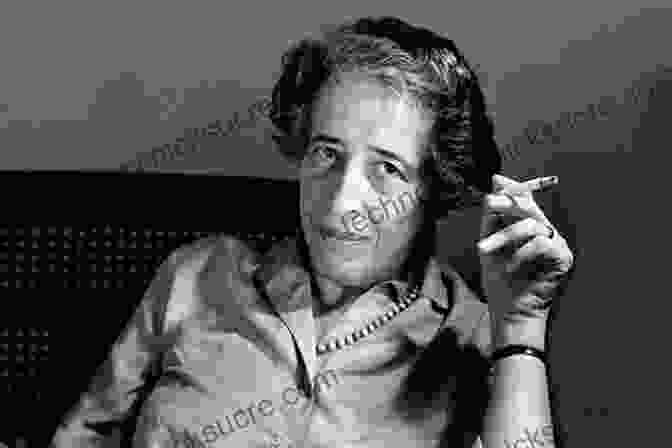
For Arendt, action is the highest form of human activity. It is through action that we make our mark on the world and leave a legacy for future generations. However, Arendt also recognizes that action can be destructive as well as creative. She famously coined the term "the banality of evil" to describe the way in which ordinary people can commit atrocious acts without any apparent remorse or guilt.
Arendt's work on the human condition has had a profound impact on our understanding of power and the nature of evil. Her writings have challenged us to think more deeply about the responsibilities that come with power and the dangers of complacency and indifference.
: Confronting the Existential Crisis of our Time
The essays of Georges Bataille, Julia Kristeva, and Hannah Arendt offer profound insights into the existential crisis of our time. They illuminate the dark and often disturbing aspects of human nature, and they challenge us to confront our own mortality and the inevitable end of our species.
In the face of unprecedented environmental degradation and the looming threat of species death, it is more important than ever to grapple with the complex
5 out of 5
| Language | : | English |
| File size | : | 3179 KB |
| Text-to-Speech | : | Enabled |
| Screen Reader | : | Supported |
| Enhanced typesetting | : | Enabled |
| Word Wise | : | Enabled |
| Print length | : | 255 pages |
| Lending | : | Enabled |
Do you want to contribute by writing guest posts on this blog?
Please contact us and send us a resume of previous articles that you have written.
 Fiction
Fiction Non Fiction
Non Fiction Romance
Romance Mystery
Mystery Thriller
Thriller SciFi
SciFi Fantasy
Fantasy Horror
Horror Biography
Biography Selfhelp
Selfhelp Business
Business History
History Classics
Classics Poetry
Poetry Childrens
Childrens Young Adult
Young Adult Educational
Educational Cooking
Cooking Travel
Travel Lifestyle
Lifestyle Spirituality
Spirituality Health
Health Fitness
Fitness Technology
Technology Science
Science Arts
Arts Crafts
Crafts DIY
DIY Gardening
Gardening Petcare
Petcare Darl Kuhn
Darl Kuhn Alberta Hawse
Alberta Hawse Brett Cohen
Brett Cohen George E Vaillant
George E Vaillant Janie B Butts
Janie B Butts Mia King
Mia King Alexander L Co
Alexander L Co Katrina M Adams
Katrina M Adams James Suzman
James Suzman Game Spark
Game Spark Leigh Hatts
Leigh Hatts Daniel Shapiro
Daniel Shapiro Kristin Gambaccini
Kristin Gambaccini Winona Guo
Winona Guo Stanley Cohen
Stanley Cohen Tetsu Kariya
Tetsu Kariya C C Hunter
C C Hunter Gail M Nelson
Gail M Nelson Marian Dewane
Marian Dewane Jennifer Estep
Jennifer Estep Peter Galison
Peter Galison Chella Man
Chella Man Anna Post
Anna Post Elena Zotova
Elena Zotova Margaret Willson
Margaret Willson Raj Kumar
Raj Kumar Aaron Robinet
Aaron Robinet Fridtjof Nansen
Fridtjof Nansen F T Lukens
F T Lukens Elizabeth White
Elizabeth White Garth Nix
Garth Nix Sam Jalloh
Sam Jalloh Jason R Rich
Jason R Rich Alex Pentland
Alex Pentland Catherine Dawson
Catherine Dawson James Patterson
James Patterson Henrik Beyer
Henrik Beyer Alan Lightman
Alan Lightman C J Brown
C J Brown Michael Sandler
Michael Sandler Kyle Rohrig
Kyle Rohrig Lisa Manterfield
Lisa Manterfield Alex Banks
Alex Banks Mark Warren
Mark Warren Darin Ingels
Darin Ingels Alex Reinhart
Alex Reinhart Andrew Zerling
Andrew Zerling Harold Klemp
Harold Klemp Linda White
Linda White Jeff Galloway
Jeff Galloway Pascal Boyer
Pascal Boyer Deborah L Davis
Deborah L Davis Alessio Mangoni
Alessio Mangoni Alex Boese
Alex Boese Ralph Vacchiano
Ralph Vacchiano Julia Wertz
Julia Wertz Sabbithry Persad Mba
Sabbithry Persad Mba Alex Riley
Alex Riley Ben Ainslie
Ben Ainslie Alex J Gutman
Alex J Gutman Luis Angel Echeverria
Luis Angel Echeverria Michael Teitelbaum
Michael Teitelbaum Chanice Lee
Chanice Lee Alex Polyakov
Alex Polyakov Aaron Reynolds
Aaron Reynolds River
River Tony Roig
Tony Roig Dan Purser Md
Dan Purser Md Martin Baldridge
Martin Baldridge Phil Jarratt
Phil Jarratt Albert Rutherford
Albert Rutherford Kortney Keisel
Kortney Keisel Laura Pavlov
Laura Pavlov Rachael Ray
Rachael Ray Vanessa Van Edwards
Vanessa Van Edwards Bob Palmer
Bob Palmer Robert W Winters
Robert W Winters Glenn Rivers
Glenn Rivers Chukwuma Eleodimuo
Chukwuma Eleodimuo Albert Marrin
Albert Marrin Jeremy Kubica
Jeremy Kubica Kristen Jane Anderson
Kristen Jane Anderson Gary Coleman
Gary Coleman Michael Digiacomo
Michael Digiacomo Morgan Lyle
Morgan Lyle Otto Kroeger
Otto Kroeger Willard A Palmer
Willard A Palmer Will Hart
Will Hart Mark Reed
Mark Reed J Richard Hackman
J Richard Hackman Yannis Detorakis
Yannis Detorakis Theodore X O Connell
Theodore X O Connell Ernest T Stringer
Ernest T Stringer Larry Pardey
Larry Pardey Fretta Reitzes
Fretta Reitzes Mine Dogucu
Mine Dogucu Emma Hansen
Emma Hansen Jennifer Van Allen
Jennifer Van Allen Scott Fratcher
Scott Fratcher Peter J Feibelman
Peter J Feibelman Peter Collier
Peter Collier Roy Plotnick
Roy Plotnick Brad Borkan
Brad Borkan Richard D Easton
Richard D Easton Alejandro Portes
Alejandro Portes Zach Davis
Zach Davis G Blake Meike
G Blake Meike Phil Hanrahan
Phil Hanrahan Todd Denault
Todd Denault Kevin Mcaleer
Kevin Mcaleer Diana L Paxson
Diana L Paxson Daniel L Everett
Daniel L Everett Lonely Planet
Lonely Planet Douglas D Scott
Douglas D Scott L R Trovillion
L R Trovillion Pamela K Lamb
Pamela K Lamb Martha Sears
Martha Sears David L Demets
David L Demets Alicia Ranoldo
Alicia Ranoldo Alex Guarnaschelli
Alex Guarnaschelli J C Herz
J C Herz Molly Knox Ostertag
Molly Knox Ostertag Gabriyell Sarom
Gabriyell Sarom Laura Morton Rd
Laura Morton Rd Alex Light
Alex Light David N Schwartz
David N Schwartz Stephon Alexander
Stephon Alexander Holly Black
Holly Black John Quick
John Quick Sarah Franklin
Sarah Franklin Tim Moore
Tim Moore Graham Hancock
Graham Hancock Alexander Mackenzie
Alexander Mackenzie Eric R Kandel
Eric R Kandel Walter Gretzky
Walter Gretzky Peter Brown
Peter Brown Brent Herrick
Brent Herrick Alex J Packer
Alex J Packer Kieran Mccarthy
Kieran Mccarthy Eric Enge
Eric Enge Philip Wylie
Philip Wylie Scott L Smith
Scott L Smith Ash Perrin
Ash Perrin Linda Egenes
Linda Egenes David Shinar
David Shinar Richard Cole
Richard Cole Saxon Andrew
Saxon Andrew Oluwaseun Ajayi
Oluwaseun Ajayi Eric Mason
Eric Mason Bill Haggerty
Bill Haggerty Keith H Basso
Keith H Basso Tracy Brown Collins
Tracy Brown Collins John Boyette
John Boyette Anatoli Boukreev
Anatoli Boukreev Phil Pierce
Phil Pierce Judy Dutton
Judy Dutton Howard Carter
Howard Carter Michael Clary
Michael Clary Denny Matthews
Denny Matthews George Marshall
George Marshall Terry Marsh
Terry Marsh Dan Gookin
Dan Gookin Michele Gelfand
Michele Gelfand Nancy Silverton
Nancy Silverton Donald D Hoffman
Donald D Hoffman Alexander Mccall Smith
Alexander Mccall Smith Jennet Conant
Jennet Conant Sarah Stewart Johnson
Sarah Stewart Johnson Peter Ross
Peter Ross Alexander Meyer
Alexander Meyer Phyllis Good
Phyllis Good Julian B Barbour
Julian B Barbour Albert J Raboteau
Albert J Raboteau Conn Iggulden
Conn Iggulden Q S Khan
Q S Khan Peter Maguire
Peter Maguire Milan Yerkovich
Milan Yerkovich Robert L Wolke
Robert L Wolke Cosmic Kids Publications
Cosmic Kids Publications Alexander Jones
Alexander Jones Megan Carle
Megan Carle Aubrey Sherman
Aubrey Sherman Deirdre Martin
Deirdre Martin Mary Ellen Hannibal
Mary Ellen Hannibal Bruce Johnson
Bruce Johnson Brian Beffort
Brian Beffort Gf Denehy
Gf Denehy Gary Nicol
Gary Nicol Rajesh K Naz
Rajesh K Naz Alexa Nicole Cucchiara
Alexa Nicole Cucchiara Duncan Butchart
Duncan Butchart Pedro Domingos
Pedro Domingos Phil Gaimon
Phil Gaimon Hannah V Holmes
Hannah V Holmes Victoria Wilson
Victoria Wilson Hannah Arendt
Hannah Arendt Nate Orlowek
Nate Orlowek Mauricio Fau
Mauricio Fau Alessandro Valerani
Alessandro Valerani Brigid Kemmerer
Brigid Kemmerer Lynn Alley
Lynn Alley William R Short
William R Short Michael Steven
Michael Steven Richard M Foxx
Richard M Foxx Rough Guides
Rough Guides Ernest Hemingway
Ernest Hemingway Stephen K Hayes
Stephen K Hayes Mark Creasy
Mark Creasy Duncan Wells
Duncan Wells Arieh Ben Naim
Arieh Ben Naim Alda Sigmundsdottir
Alda Sigmundsdottir Sky Marsen
Sky Marsen Charlene L Edge
Charlene L Edge Albert Hofmann
Albert Hofmann Sarah Ockwell Smith
Sarah Ockwell Smith Karen Casey
Karen Casey Alex Mars
Alex Mars Ellen Snortland
Ellen Snortland Lyn Kelley
Lyn Kelley Derek Lundy
Derek Lundy Kent David Kelly
Kent David Kelly John Burroughs
John Burroughs Philip Ball
Philip Ball Shannon Jett
Shannon Jett Margaret Rooke
Margaret Rooke Ken Schultz
Ken Schultz Suzanna Mcgee
Suzanna Mcgee Douglas Doman
Douglas Doman Qaiser Feroze
Qaiser Feroze Erin Bowe
Erin Bowe Robert Dos Remedios
Robert Dos Remedios Fiaz Rafiq
Fiaz Rafiq Carla Naumburg
Carla Naumburg Wesley Bernardini
Wesley Bernardini Ari Mennander
Ari Mennander Kevin Bales
Kevin Bales Alex Harris
Alex Harris Scott Kelly
Scott Kelly Evan F Moore
Evan F Moore Elissa Wall
Elissa Wall Alex Zimmerman
Alex Zimmerman James Johonnot
James Johonnot Michael Terry
Michael Terry Vasti Torres
Vasti Torres Celeste Headlee
Celeste Headlee L Michele Issel
L Michele Issel Nikki Nichols
Nikki Nichols Alexander Ferrauti
Alexander Ferrauti P J Agness
P J Agness Amy Newmark
Amy Newmark Eric Zandona
Eric Zandona Tiffany Dionne
Tiffany Dionne Sally Moomaw
Sally Moomaw Howard Schor
Howard Schor Kirsten Koza
Kirsten Koza Kathryn Purdie
Kathryn Purdie Phil Keith
Phil Keith Alex Hibbert
Alex Hibbert Peter Matthiessen
Peter Matthiessen Albert W A Schmid
Albert W A Schmid Alistair Moffat
Alistair Moffat Stephen L Sass
Stephen L Sass Joe Nobody
Joe Nobody Alexandra Bracken
Alexandra Bracken Christie Cognevich
Christie Cognevich Stephanie Ermenegild
Stephanie Ermenegild Olivia Wildenstein
Olivia Wildenstein Alex Johnson
Alex Johnson Thomas Huhti
Thomas Huhti Albert S Tarendash
Albert S Tarendash Jase Robertson
Jase Robertson Thomas Cahill
Thomas Cahill Robert Benson
Robert Benson Alex Bezzerides
Alex Bezzerides Simon Monk
Simon Monk Alex Bellos
Alex Bellos Jerry C Whitaker
Jerry C Whitaker Kinsey Phifer
Kinsey Phifer Earl Swift
Earl Swift Pittacus Lore
Pittacus Lore Beverleigh H Piepers
Beverleigh H Piepers Derrick Niederman
Derrick Niederman Stan Utley
Stan Utley Robbie Couch
Robbie Couch R K Gupta
R K Gupta Loriann Oberlin
Loriann Oberlin Lisa Silverman
Lisa Silverman Sara Shepard
Sara Shepard Robert Penn
Robert Penn Janine Marsh
Janine Marsh Austin Murphy
Austin Murphy Christina Riggs
Christina Riggs Alexander Clarke
Alexander Clarke Jenny Mackay
Jenny Mackay Scott Butler
Scott Butler Julie Berry
Julie Berry Josh Bryant
Josh Bryant Mark Sisson
Mark Sisson Leonhard Euler
Leonhard Euler Geza Vermes
Geza Vermes Patrick Alan Danaher
Patrick Alan Danaher Danielle Tumminio Hansen
Danielle Tumminio Hansen Dr Yvonne S Thornton
Dr Yvonne S Thornton David Leadbetter
David Leadbetter Soo Kim Abboud
Soo Kim Abboud Chris Englert
Chris Englert Sabine Hossenfelder
Sabine Hossenfelder K D Hume
K D Hume Daniel Pautrat
Daniel Pautrat Jacob Sannox
Jacob Sannox Don Pitcher
Don Pitcher Mark Golds
Mark Golds Stephan Martin
Stephan Martin Catherine Crier
Catherine Crier George Ehrenhaft
George Ehrenhaft Mary Lynne Fernandez
Mary Lynne Fernandez Genese Marie Sodikoff
Genese Marie Sodikoff Yang Erche Namu
Yang Erche Namu Katie Edwards
Katie Edwards Rebecca Schrag Hershberg
Rebecca Schrag Hershberg Greg Michaelson
Greg Michaelson Gordon Rugg
Gordon Rugg Ruth Minsky Sender
Ruth Minsky Sender Gabriel Levy
Gabriel Levy Namita Prasad
Namita Prasad Brent Zwerneman
Brent Zwerneman Scott Turansky
Scott Turansky Caren Cooper
Caren Cooper Aleksandr Anufriyev
Aleksandr Anufriyev Dan Jacob
Dan Jacob Meredith Atwood
Meredith Atwood Marilynn Hughes
Marilynn Hughes Stephen R Lawhead
Stephen R Lawhead Paul Volponi
Paul Volponi Sareen S Gropper
Sareen S Gropper Jenna Gottlieb
Jenna Gottlieb Eli Burakian
Eli Burakian Lake E High
Lake E High Celia Hodent
Celia Hodent Gigi Georges
Gigi Georges Amanda Epperson
Amanda Epperson John Thorne
John Thorne Nate Silver
Nate Silver Kalynn Bayron
Kalynn Bayron Cary Nemeroff
Cary Nemeroff Jim Hynes
Jim Hynes Saunders Mac Lane
Saunders Mac Lane Anne Dachel
Anne Dachel Patrick F Mcmanus
Patrick F Mcmanus Sarah Lynne Bowman
Sarah Lynne Bowman Steve Helling
Steve Helling Danielle Paige
Danielle Paige Gordon Feinberg
Gordon Feinberg Olivier Doleuze
Olivier Doleuze Jacqueline Tourville
Jacqueline Tourville Michele Filgate
Michele Filgate Sheryl Buckland
Sheryl Buckland Fataniss Store
Fataniss Store Jimmy Connors
Jimmy Connors David Farrier
David Farrier Georgiann Davis
Georgiann Davis Don Bendell
Don Bendell Jennifer Boyle
Jennifer Boyle Jeana Jorgensen
Jeana Jorgensen Jerry C Zee
Jerry C Zee Andrew Stellman
Andrew Stellman Scott Whitlock
Scott Whitlock Joan Wulff
Joan Wulff Dr Rebecca Harwin
Dr Rebecca Harwin Steve Flink
Steve Flink Pekka Louhiala
Pekka Louhiala Roseanne A Brown
Roseanne A Brown Vimla L Patel
Vimla L Patel Angelo Tropea
Angelo Tropea Dipika Mukherjee
Dipika Mukherjee Itzhak Bentov
Itzhak Bentov Paul Trammell
Paul Trammell David Borgenicht
David Borgenicht Cecil B Hartley
Cecil B Hartley Aman Gupta
Aman Gupta Sally Huss
Sally Huss Hiro Ainana
Hiro Ainana Alex Itsios
Alex Itsios Moh Kolli Carnet
Moh Kolli Carnet Janja Lalich
Janja Lalich Steve Warner
Steve Warner Sam Sheridan
Sam Sheridan Thomas Jaden
Thomas Jaden Jennifer Kramer
Jennifer Kramer Upgraded Brain
Upgraded Brain Dennis R Helsel
Dennis R Helsel Alexander Bennett
Alexander Bennett Taylor Harris
Taylor Harris Devin Devasquez
Devin Devasquez Stormie Omartian
Stormie Omartian Patrick Taylor
Patrick Taylor Diana Hopkins
Diana Hopkins David Thomas
David Thomas Matthew Johnson
Matthew Johnson Laura Eckert
Laura Eckert Chuck Norris
Chuck Norris Kathleen Mcmillan
Kathleen Mcmillan Katherine Leigh
Katherine Leigh Alex Morgan
Alex Morgan Sophie David
Sophie David Marvin Harris
Marvin Harris Audra Fordin
Audra Fordin Alberto Villoldo
Alberto Villoldo Anne Bogel
Anne Bogel Kevin Gallagher
Kevin Gallagher S Kelley Harrell
S Kelley Harrell Hal Higdon
Hal Higdon Alex Hunter
Alex Hunter Arshay Cooper
Arshay Cooper Travis Eliot
Travis Eliot Suzanne Collins
Suzanne Collins Kingsley Amis
Kingsley Amis Russ Unger
Russ Unger Robert Spindler
Robert Spindler Daniel Defoe
Daniel Defoe Nancy Marie Brown
Nancy Marie Brown Alex Wade
Alex Wade Suzie Sheehy
Suzie Sheehy Hadley Wickham
Hadley Wickham Wallace Wang
Wallace Wang Jim Davidson
Jim Davidson Jon B Gould
Jon B Gould Barbara Ehrenreich
Barbara Ehrenreich Alex Wolf
Alex Wolf David N Myers
David N Myers Alexa Whitewolf
Alexa Whitewolf Idan Ravin
Idan Ravin Stephen Wilbers
Stephen Wilbers Alfie Kohn
Alfie Kohn Jules Wake
Jules Wake Titania Hardie
Titania Hardie Paul Sating
Paul Sating Jon Krakauer
Jon Krakauer Michael Thompson
Michael Thompson Amber Lia
Amber Lia Tim Cahill
Tim Cahill Rebecca Wilson
Rebecca Wilson Donnie Eichar
Donnie Eichar Thomas Sowell
Thomas Sowell Jennifer Cohen Harper
Jennifer Cohen Harper David J Chalmers
David J Chalmers Richard Shotton
Richard Shotton Chip Heath
Chip Heath Victoria Schwab
Victoria Schwab Victor Davis Hanson
Victor Davis Hanson Aleister Crowley
Aleister Crowley Alex Gillis
Alex Gillis John Kretschmer
John Kretschmer Bertus Engelbrecht
Bertus Engelbrecht Lara S Ormiston
Lara S Ormiston Steve Bechtel
Steve Bechtel Matt Johanson
Matt Johanson Alfred P Rovai
Alfred P Rovai Richard Ronald
Richard Ronald John Stage
John Stage Ashton Cartwright
Ashton Cartwright Heather Dale
Heather Dale Ron Mckeefery
Ron Mckeefery W C Mcrae
W C Mcrae Elon Vidal
Elon Vidal Teresa Denton
Teresa Denton David G Kleinbaum
David G Kleinbaum Robertson Tait
Robertson Tait Albert Ellis
Albert Ellis Alexander Boxer
Alexander Boxer Ben Malisow
Ben Malisow
Light bulbAdvertise smarter! Our strategic ad space ensures maximum exposure. Reserve your spot today!
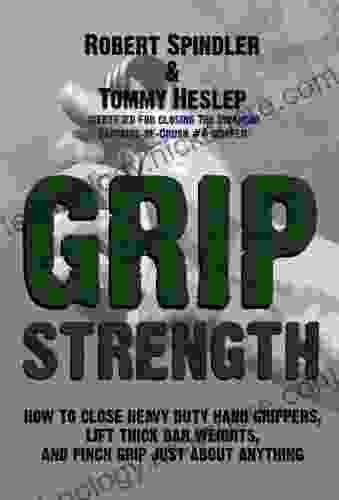
 Earl WilliamsUnleash Your Grip Strength: A Comprehensive Guide to Training Heavy Duty Hand...
Earl WilliamsUnleash Your Grip Strength: A Comprehensive Guide to Training Heavy Duty Hand... Theo CoxFollow ·7.1k
Theo CoxFollow ·7.1k Ricky BellFollow ·11.9k
Ricky BellFollow ·11.9k Edwin BlairFollow ·19.3k
Edwin BlairFollow ·19.3k Avery SimmonsFollow ·16.2k
Avery SimmonsFollow ·16.2k Arthur Conan DoyleFollow ·15.5k
Arthur Conan DoyleFollow ·15.5k Robert ReedFollow ·4.8k
Robert ReedFollow ·4.8k Edmund HayesFollow ·13.1k
Edmund HayesFollow ·13.1k Chuck MitchellFollow ·18.9k
Chuck MitchellFollow ·18.9k

 Jeffrey Cox
Jeffrey CoxEasy Recipes And Meal Plans For Healthy Pregnancy
Congratulations on...
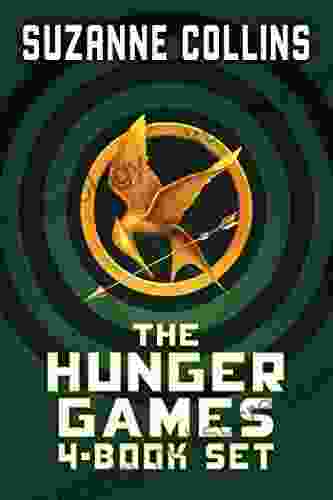
 Andy Cole
Andy ColeDive into the Fiery Ordeal and Mockingjay's Rebellion: An...
: A Captivating Dystopian Saga The...
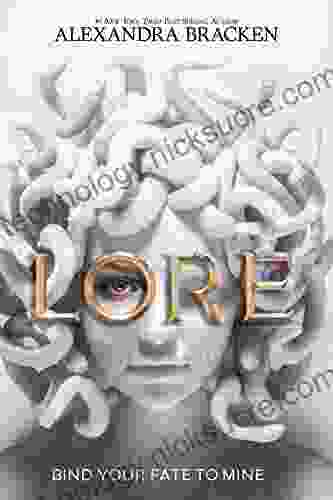
 Ernest Powell
Ernest PowellLore Alexandra Bracken: Unveiling the Mastermind Behind...
: In the vast expanse of contemporary...
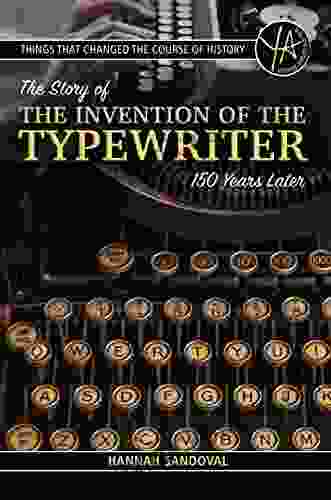
 T.S. Eliot
T.S. EliotThe Story of the Invention of the Typewriter: 150 Years...
The typewriter, a...
5 out of 5
| Language | : | English |
| File size | : | 3179 KB |
| Text-to-Speech | : | Enabled |
| Screen Reader | : | Supported |
| Enhanced typesetting | : | Enabled |
| Word Wise | : | Enabled |
| Print length | : | 255 pages |
| Lending | : | Enabled |


